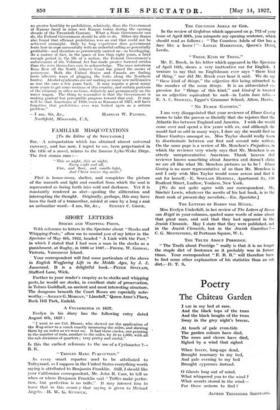SHORT LETTERS STOCKS AND WHIPPING POSTS.
With reference to letters in the Spectator about "Stocks and Whipping-Posts," allow me to remind you of my letter in the Spectator of May 6th, 1922, headed A Link with the Past," in which I stated that I had seen a man in the stocks as a
punishment, at Rugby, in 1866 or 1867.—FnEnx. W. GonsAL, Victoria, Vancouver Island.
Your correspondent will find some particulars of the above in English Wayfaring Life in the Middle Ages, by J. J. 3usserand. It is a delightful book.—PETER SINCLAIR, Stafford Lane, Wick.
Further to your reader's enquiry as to stocks and whipping posts, he would see stocks, in excellent state of preservation, in Totnes Guildhall, an ancient and most interesting structure. The dungeons beneath the Court Room are especially note-
worthy.—AILEEN G. MORGAN, " Llandaff," Queen Anne's Place, Bush Hill Park, Enfield.
A CYCLOMETER IN 1657.
Evelyn in his diary has the following entry dated August 6th, 1657 :
" I went to see Col. Blount, who shewed mo the application of the Way-wiser to a coach exactly measuring the miles, and showing them by an index as we went on. It had three circles, one pointing to the number of rods, another to the miles, by 10 to 1,000, with all the sub-divisions of quarters ; very pretty and useful."
Is this the earliest reference to the use of a Cyclometer ?-- R. K.
" TRIFLES MARE PI II SECTION."
As every smart repartee used to be attributed to Talleyrand, so I suppose in the United States everything worth saying is attributed to Benjamin Franklin. Still, I should like your Californian correspondent, Mr. John R. Case, to tell us when or where Benjamin Franklin said " Trifles make perfec- tion, but perfection is no trifle." It may interest him to
learn that in this country that saying is given to Michael
Angelo. --H. W. G. KENRICK. . .
THE COUNTESS ADELA• OF GER.
- In the review of Gerfalcon which-appeared on p. 772 of your issue of April 30th, you misquote my opening sentence, which should read as follows : " The Countess Ade.la of Ger has a face like a • horse ! "—LESLIE BARRINGER, Queen's Hotel, Leeds.
" THESE KIND OF THING."
Mr. E. Breck, in his letter which appeared in the Spectator of April 16th, shows a very inattentive ear for English. I venture to say that no Englishman ever says " these kind of thing," nor did Mr. Breck ever hear it said. We do say " these kind of things," the adjective this being attracted to the number of the noun things. It is an abbreviated ex- pression for " things of this kind," and kind-of is treated as an adjective equivalent to such—in Latin haec E. A. C. STOWELL, Eggar's Grammar School, Alton, Hants.
" No EL3IER GANTRYS."
I am very disappointed that your reviewer of Elmer Gantry seems to take the parson so literally that she rejoices that the Atlantic lies between England and America. I wish she would come over and spend a few years with us, and although she would find us odd in many ways, I dare say she would find no Elmer Gantrys amongst us. Miss Taylor should really learn to discriminate between our first and second rate writers. On the same page is a review of Mr. Mencken's Prejudices, in which the reviewer very wisely says that Mr. Meneken is an utterly unrepresentative American. Thank heaven that reviewer knows something about America and doesn't claim we are all like what Mr. Meneken pictures us to be ! Elmer Gantry is no more representative of us than Mr. Meneken is and I only wish Miss Taylor would come across and find it out for herself.—E. SINCLAIR HERTELL, Apartment 3A, 159 Radford Street, Ludlow, Yonkers, New York.
[We do not quite agree with our correspondent. Mr. Sinclair Lewis, whatever the merits of his last book, is in the front rank of present-day novelists.—En. Spectator.] THE LETTERS OF BARON VON IIUGEL.
Miss Evelyn Underhill, in her review of The Letters of Baran von Hugel in your columns, quoted some words of mine about that great man, and said that they had appeared in the Jewish Chronicle. May I state that they were published, not in the Jewish Chronicle, but in the Jewish Guardian ?— C. G. MoNTEvionE, 42 Portman Square, W. 1.
THE TRUTH ABOUT PORRIDGE.
" The Truth about Porridge " really is that it is no longer the staple diet of Scotsmen as it probably was in former, times. Your correspondent " E. B. B." will therefore have to find some other explanation of his statistics than an oat. diet.—D. T. S.


























































 Previous page
Previous page